英语零基础学语法零基础学好英语语法pdf
- 格式:doc
- 大小:15.37 KB
- 文档页数:5
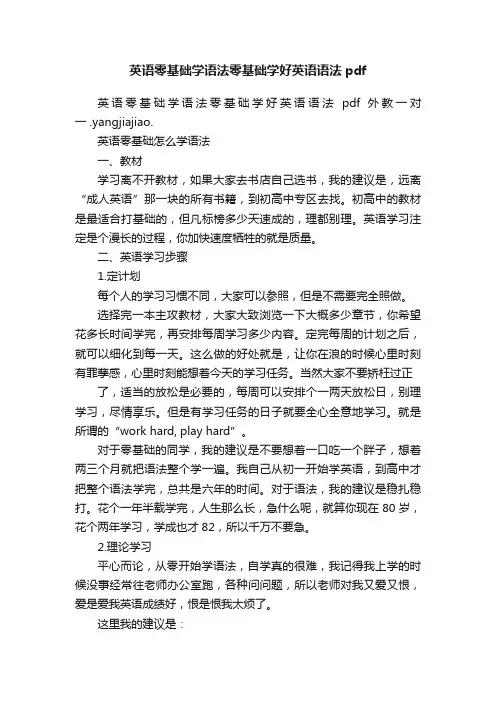
英语零基础学语法零基础学好英语语法pdf英语零基础学语法零基础学好英语语法pdf 外教一对一 .yangjiajiao.英语零基础怎么学语法一、教材学习离不开教材,如果大家去书店自己选书,我的建议是,远离“成人英语”那一块的所有书籍,到初高中专区去找。
初高中的教材是最适合打基础的,但凡标榜多少天速成的,理都别理。
英语学习注定是个漫长的过程,你加快速度牺牲的就是质量。
二、英语学习步骤1.定计划每个人的学习习惯不同,大家可以参照,但是不需要完全照做。
选择完一本主攻教材,大家大致浏览一下大概多少章节,你希望花多长时间学完,再安排每周学习多少内容。
定完每周的计划之后,就可以细化到每一天。
这么做的好处就是,让你在浪的时候心里时刻有罪孽感,心里时刻能想着今天的学习任务。
当然大家不要矫枉过正了,适当的放松是必要的,每周可以安排个一两天放松日,别理学习,尽情享乐。
但是有学习任务的日子就要全心全意地学习。
就是所谓的“work hard, play hard”。
对于零基础的同学,我的建议是不要想着一口吃一个胖子,想着两三个月就把语法整个学一遍。
我自己从初一开始学英语,到高中才把整个语法学完,总共是六年的时间。
对于语法,我的建议是稳扎稳打。
花个一年半载学完,人生那么长,急什么呢,就算你现在80岁,花个两年学习,学成也才82,所以千万不要急。
2.理论学习平心而论,从零开始学语法,自学真的很难,我记得我上学的时候没事经常往老师办公室跑,各种问问题,所以老师对我又爱又恨,爱是爱我英语成绩好,恨是恨我太烦了。
这里我的建议是:(1) 到网上找初高中语法讲解视频。
大家记住,是初高中的。
譬如你不懂宾语从句,那就到网上搜宾语从句的讲解视频。
视频讲解比自己看书好懂多了。
(2) 报个班不要相信打着多少天速成的那种英语补习班,针对成人的英语补习班我也强烈不建议,因为价格普遍很高,但是师资质量你无从考证,就算人家有什么专八证书,也不能证明他们语法过硬、能讲出门道。
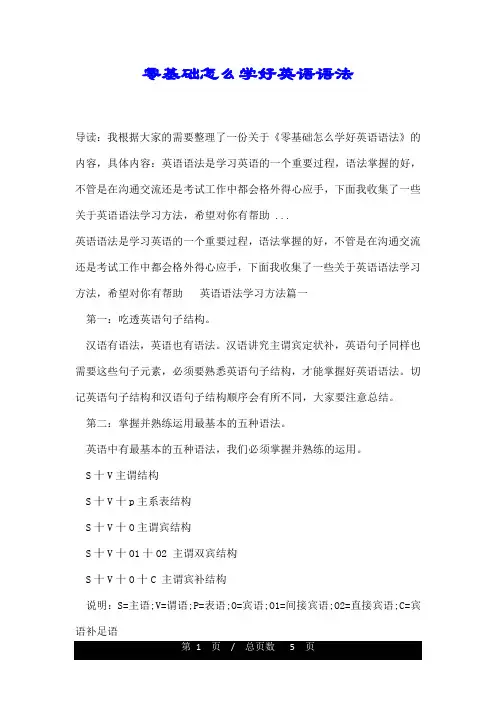
零基础怎么学好英语语法导读:我根据大家的需要整理了一份关于《零基础怎么学好英语语法》的内容,具体内容:英语语法是学习英语的一个重要过程,语法掌握的好,不管是在沟通交流还是考试工作中都会格外得心应手,下面我收集了一些关于英语语法学习方法,希望对你有帮助 ...英语语法是学习英语的一个重要过程,语法掌握的好,不管是在沟通交流还是考试工作中都会格外得心应手,下面我收集了一些关于英语语法学习方法,希望对你有帮助英语语法学习方法篇一第一:吃透英语句子结构。
汉语有语法,英语也有语法。
汉语讲究主谓宾定状补,英语句子同样也需要这些句子元素,必须要熟悉英语句子结构,才能掌握好英语语法。
切记英语句子结构和汉语句子结构顺序会有所不同,大家要注意总结。
第二:掌握并熟练运用最基本的五种语法。
英语中有最基本的五种语法,我们必须掌握并熟练的运用。
S十V主谓结构S十V十p主系表结构S十V十O主谓宾结构S十V十O1十O2 主谓双宾结构S十V十O十C 主谓宾补结构说明:S=主语;V=谓语;P=表语;O=宾语;O1=间接宾语;O2=直接宾语;C=宾语补足语第三:英语语法与单词记忆相结合。
英语语法是有单词组成,单个单词的记忆也许是没有多大难度的,但是如果英语语法和单词的记忆同时进行,既增加了学习英语的趣味性,又减轻了英语语法的学习难度,这样我们就更容易去把握英语语法。
第四:理论和实践相结合。
当我们有了一定的语法基础后,我们就需要通过口语练习来巩固已经掌握的语法知识,在练习中,我们可以进行查缺补漏,找到自己在语法学习中存在的不足。
第五:及时复习,巩固知识。
学了的东西随着时间的流逝会逐渐遗忘,学习语言也不例外。
因此不必因为有遗忘现象而影响自己学好英语的信心与决心,即使今天记住的单词明天遗忘也属正常现象。
问题在于如何减少遗忘的程度?善于类比,总结知识,把所学的知识与过去学的有关知识进行横向和纵向的比较和联系。
英语语法学习方法篇二1.学习语法要重视在真实的语境中、英语长难句中、课文阅读中、美文赏析中、范文的记诵中感知,运用语法,从而达到用英语进行口头,笔头交际的能力。
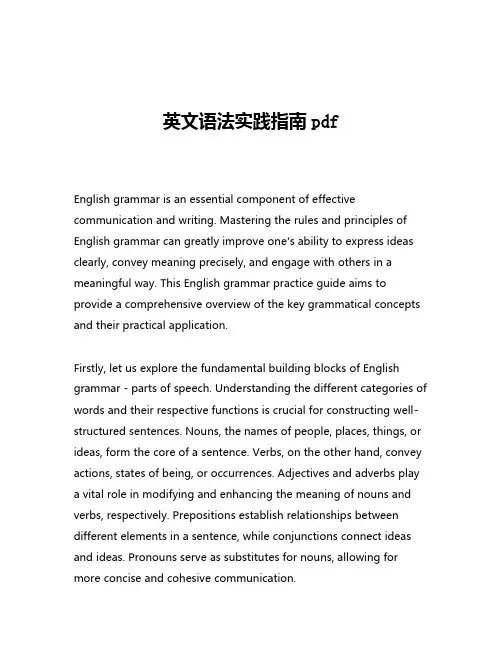
英文语法实践指南pdfEnglish grammar is an essential component of effective communication and writing. Mastering the rules and principles of English grammar can greatly improve one's ability to express ideas clearly, convey meaning precisely, and engage with others in a meaningful way. This English grammar practice guide aims to provide a comprehensive overview of the key grammatical concepts and their practical application.Firstly, let us explore the fundamental building blocks of English grammar - parts of speech. Understanding the different categories of words and their respective functions is crucial for constructing well-structured sentences. Nouns, the names of people, places, things, or ideas, form the core of a sentence. Verbs, on the other hand, convey actions, states of being, or occurrences. Adjectives and adverbs play a vital role in modifying and enhancing the meaning of nouns and verbs, respectively. Prepositions establish relationships between different elements in a sentence, while conjunctions connect ideas and ideas. Pronouns serve as substitutes for nouns, allowing for more concise and cohesive communication.Delving deeper into sentence structure, we encounter the fundamental components - subjects, predicates, and objects. The subject is the person, place, or thing that the sentence is about, while the predicate contains the verb and any additional information about the subject. The object, which can be direct or indirect, receives the action of the verb. Mastering the proper placement and relationship between these elements is essential for crafting coherent and grammatically correct sentences.One of the most challenging aspects of English grammar is the proper use of verb tenses. The English language offers a rich tapestry of tenses, each conveying a distinct temporal perspective. From the simple present and past to the more complex progressive and perfect tenses, understanding the appropriate application of each tense is crucial for accurately expressing time and sequence of events. Consistent and accurate use of verb tenses can greatly enhance the clarity and precision of one's writing.Another crucial element of English grammar is subject-verb agreement. This principle dictates that the verb must agree with the subject in number (singular or plural) and person (first, second, or third). Maintaining subject-verb agreement is essential for constructing grammatically sound sentences and avoiding common errors that can undermine the effectiveness of communication.Equally important is the proper use of pronouns, both personal and possessive. Ensuring that pronouns correctly refer to their antecedents and that possessive pronouns accurately convey ownership or association can significantly improve the coherence and flow of a written text.Sentence structure and variety also play a crucial role in effective communication. While simple, straightforward sentences have their place, incorporating more complex sentence structures, such as compound, complex, and compound-complex sentences, can add depth, nuance, and sophistication to one's writing. Mastering the art of sentence construction and variation can elevate the overall quality and impact of one's written expression.Punctuation, though often overlooked, is an essential component of English grammar. The proper use of punctuation marks, such as periods, commas, semicolons, and apostrophes, can significantly impact the meaning and clarity of a written text. Understanding the guidelines for punctuation usage can help writers convey their intended message with precision and clarity.Finally, the importance of proofreading and editing cannot be overstated. Even the most experienced writers can benefit from carefully reviewing their work for grammatical errors, inconsistencies,and opportunities for improvement. By taking the time to proofread and edit, writers can ensure that their final product is polished, coherent, and reflective of their best efforts.In conclusion, this English grammar practice guide has explored the key elements of English grammar, from parts of speech to sentence structure, verb tenses, subject-verb agreement, pronoun usage, and punctuation. By understanding and applying these principles, writers can enhance their ability to communicate effectively, express their ideas with clarity and precision, and engage with their audience in a meaningful and impactful way. Continuous practice and a commitment to improving one's grammatical skills can lead to significant advancements in written communication and overall language proficiency.。
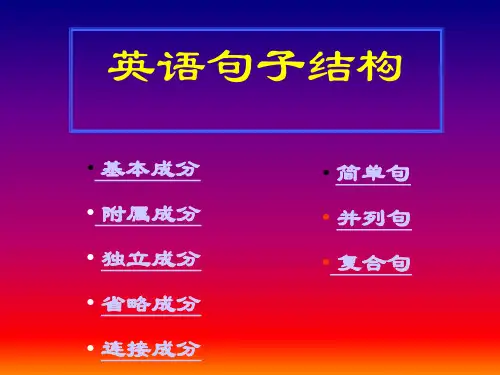
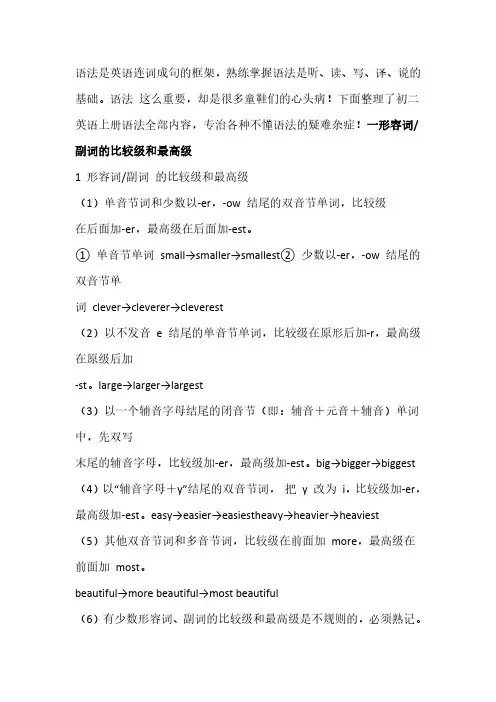
语法是英语连词成句的框架,熟练掌握语法是听、读、写、译、说的基础。
语法这么重要,却是很多童鞋们的心头病!下面整理了初二英语上册语法全部内容,专治各种不懂语法的疑难杂症!一形容词/副词的比较级和最高级1形容词/副词的比较级和最高级(1)单音节词和少数以-er,-ow结尾的双音节单词,比较级在后面加-er,最高级在后面加-est。
①单音节单词small→smaller→smallest②少数以-er,-ow结尾的双音节单词clever→cleverer→cleverest(2)以不发音e结尾的单音节单词,比较级在原形后加-r,最高级在原级后加-st。
large→larger→largest(3)以一个辅音字母结尾的闭音节(即:辅音+元音+辅音)单词中,先双写末尾的辅音字母,比较级加-er,最高级加-est。
big→bigger→biggest (4)以“辅音字母+y”结尾的双音节词,把y改为i,比较级加-er,最高级加-est。
easy→easier→easiestheavy→heavier→heaviest(5)其他双音节词和多音节词,比较级在前面加more,最高级在前面加most。
beautiful→more beautiful→most beautiful(6)有少数形容词、副词的比较级和最高级是不规则的,必须熟记。
good→better→bestwell→better→best2形容词和副词比较级的用法(1)“甲+be+(倍数)+形容词比较级+than+乙”表示“甲比乙…”或“甲比乙…几倍”。
Tom is taller than Kate.汤姆比凯特高。
(2)“甲+实意动词+(倍数)+副词比较级+than+乙”表示“甲比乙…”或“甲比乙…几倍”。
I got up earlier than my mother this morning.我今天早晨起床比我妈妈还早。
3形容词和副词最高级的用法(1)“主语+be+the+形容词最高级(+单数名词)+in/of...”表示“……是……中最……的”。
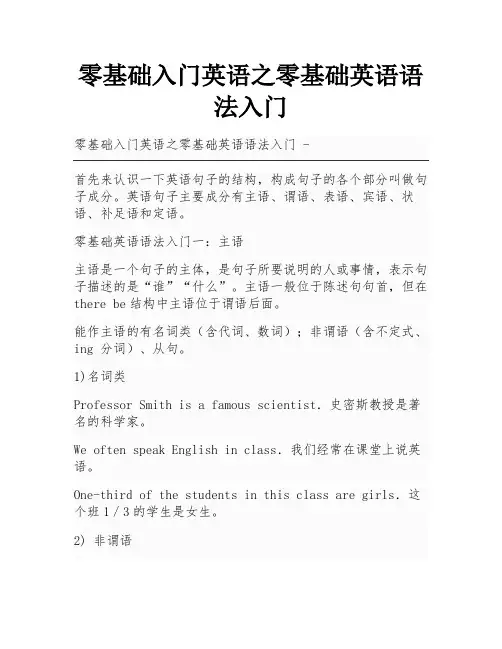
零基础入门英语之零基础英语语法入门首先来认识一下英语句子的结构,构成句子的各个部分叫做句子成分。
英语句子主要成分有主语、谓语、表语、宾语、状语、补足语和定语。
零基础英语语法入门一:主语主语是一个句子的主体,是句子所要说明的人或事情,表示句子描述的是“谁”“什么”。
主语一般位于陈述句句首,但在there be结构中主语位于谓语后面。
能作主语的有名词类(含代词、数词);非谓语(含不定式、ing 分词)、从句。
1)名词类Professor Smith is a famous scientist.史密斯教授是著名的科学家。
We often speak English in class.我们经常在课堂上说英语。
One-third of the students in this class are girls.这个班1/3的学生是女生。
2) 非谓语To master a foreign language is necessary.掌握一门外语是必要的。
Smoking does harm to the health.吸烟有害健康。
3)从句When we are going to have an English test has not been decided yet.我们什么时候进行英语测验还没有决定。
Whether he’ll join us in the discussion is of great importance.他是否参加我们的讨论是很重要的。
零基础英语语法入门二:谓语谓语说明主语所做的动作或具有的特征和状态。
只有动词在句中才能作谓语,一般放在主语之后。
1)简单谓语由一个动词或动词短语构成。
如:He practices running every morning.他每天早晨练习跑步。
Yesterday afternoon he reached China.昨天下午他到达桂林。
2)复合谓语(1)由情态动词或其他助动词加动词原形构成You may keep the book for two weeks.这本书你可以借两周。
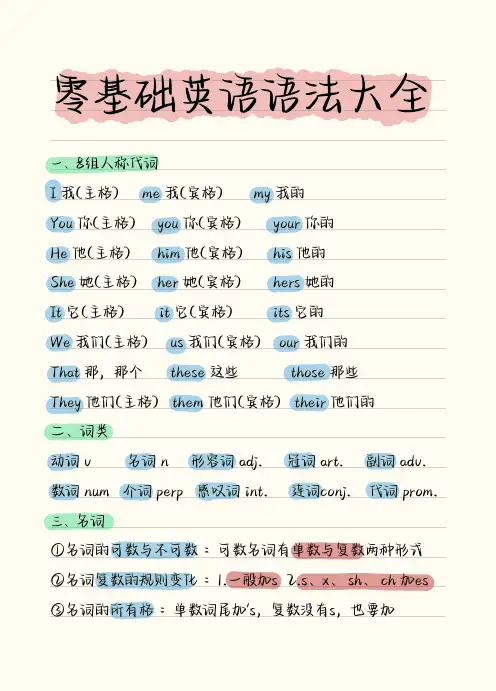
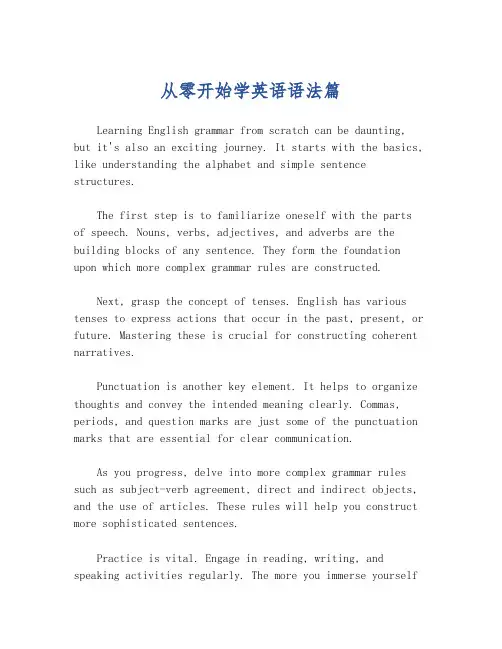
从零开始学英语语法篇Learning English grammar from scratch can be daunting, but it's also an exciting journey. It starts with the basics, like understanding the alphabet and simple sentence structures.The first step is to familiarize oneself with the parts of speech. Nouns, verbs, adjectives, and adverbs are the building blocks of any sentence. They form the foundation upon which more complex grammar rules are constructed.Next, grasp the concept of tenses. English has various tenses to express actions that occur in the past, present, or future. Mastering these is crucial for constructing coherent narratives.Punctuation is another key element. It helps to organize thoughts and convey the intended meaning clearly. Commas, periods, and question marks are just some of the punctuation marks that are essential for clear communication.As you progress, delve into more complex grammar rules such as subject-verb agreement, direct and indirect objects, and the use of articles. These rules will help you construct more sophisticated sentences.Practice is vital. Engage in reading, writing, and speaking activities regularly. The more you immerse yourselfin the language, the more intuitive the grammar rules will become.Finally, don't be afraid to make mistakes. They are a natural part of the learning process. Each error is an opportunity to learn and improve your understanding of English grammar.。
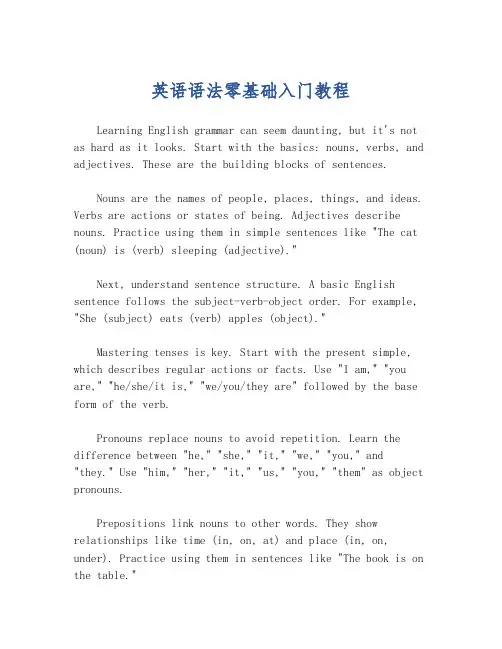
英语语法零基础入门教程Learning English grammar can seem daunting, but it's not as hard as it looks. Start with the basics: nouns, verbs, and adjectives. These are the building blocks of sentences.Nouns are the names of people, places, things, and ideas. Verbs are actions or states of being. Adjectives describe nouns. Practice using them in simple sentences like "The cat (noun) is (verb) sleeping (adjective)."Next, understand sentence structure. A basic English sentence follows the subject-verb-object order. For example, "She (subject) eats (verb) apples (object)."Mastering tenses is key. Start with the present simple, which describes regular actions or facts. Use "I am," "you are," "he/she/it is," "we/you/they are" followed by the base form of the verb.Pronouns replace nouns to avoid repetition. Learn the difference between "he," "she," "it," "we," "you," and "they." Use "him," "her," "it," "us," "you," "them" as object pronouns.Prepositions link nouns to other words. They show relationships like time (in, on, at) and place (in, on, under). Practice using them in sentences like "The book is on the table."Finally, practice makes perfect. Read English texts,watch movies, and speak with others. The more you use grammar, the more natural it becomes.。

2小时学完零基础语法简英英语学习任何语言都需要时间和持续的努力,尤其是对于零基础的学习者来说。
虽然在2小时内完全掌握英语的语法是不太可能的,但是你可以在这段时间内初步了解一些基本的语法规则和结构。
下面我将从多个角度来回答你的问题。
首先,学习英语语法需要掌握一些基础知识。
你可以开始学习英语的基本词汇和句型,例如主语、谓语、宾语和修饰语等。
了解这些基本概念可以帮助你理解句子的结构和意义。
其次,了解英语的时态是非常重要的。
英语有多种时态,包括一般现在时、过去时、将来时等。
掌握这些时态的用法可以帮助你正确地表达过去、现在和将来的动作或状态。
此外,了解英语的语法规则也是必要的。
例如,学习名词的单复数形式、动词的时态和语态变化、形容词和副词的比较级和最高级等。
掌握这些规则可以帮助你构建正确的句子并避免常见的语法错误。
另外,学习英语语法还需要大量的练习和实践。
你可以通过做练习题、阅读英语文章、听英语对话和参与英语交流来提高你的语法水平。
这样可以帮助你巩固所学的知识并提高你的语言运用能力。
此外,使用一些辅助工具也可以帮助你学习英语语法。
例如,语法书籍、在线课程、语法应用程序等都可以提供额外的学习资源和练习机会。
最后,要记住学习语法是一个渐进的过程,需要时间和耐心。
不要期望在短时间内完全掌握英语的语法,而是要持续学习并不断提高。
通过积累知识、练习和实践,你会逐渐掌握英语的语法规则并提高你的语言能力。
总结起来,学习英语语法需要时间、持续的努力和多种学习方法的结合。
虽然不能在短时间内完全掌握,但通过不断学习和实践,你可以逐渐提高你的语法水平。
希望这些信息对你有帮助!。
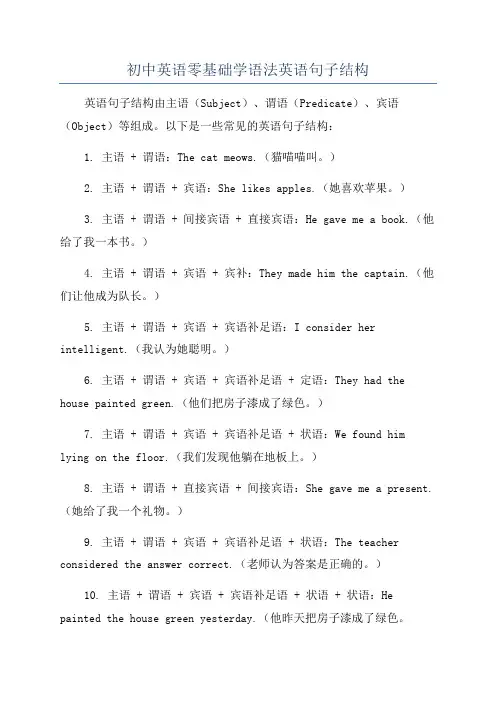
初中英语零基础学语法英语句子结构英语句子结构由主语(Subject)、谓语(Predicate)、宾语(Object)等组成。
以下是一些常见的英语句子结构:1. 主语 + 谓语:The cat meows.(猫喵喵叫。
)2. 主语 + 谓语 + 宾语:She likes apples.(她喜欢苹果。
)3. 主语 + 谓语 + 间接宾语 + 直接宾语:He gave me a book.(他给了我一本书。
)4. 主语 + 谓语 + 宾语 + 宾补:They made him the captain.(他们让他成为队长。
)5. 主语 + 谓语 + 宾语 + 宾语补足语:I consider her intelligent.(我认为她聪明。
)6. 主语 + 谓语 + 宾语 + 宾语补足语 + 定语:They had the house painted green.(他们把房子漆成了绿色。
)7. 主语 + 谓语 + 宾语 + 宾语补足语 + 状语:We found him lying on the floor.(我们发现他躺在地板上。
)8. 主语 + 谓语 + 直接宾语 + 间接宾语:She gave me a present.(她给了我一个礼物。
)9. 主语 + 谓语 + 宾语 + 宾语补足语 + 状语:The teacher considered the answer correct.(老师认为答案是正确的。
)10. 主语 + 谓语 + 宾语 + 宾语补足语 + 状语 + 状语:He painted the house green yesterday.(他昨天把房子漆成了绿色。
这些是一些常见的英语句子结构,可以根据需要进行组合和变化。
建议学习者在学习过程中多读多写句子,加深对英语句子结构的理解和掌握。
学英语语法的目的:造句。
所有的句子都是在简单句的基础上组合而成的。
除去那些“嗯,”“哦,”“啊!”,或省略句,或向整句提问的问句,全部都是在说“什么怎么样”。
绝大部分的句子粗略的分一共就只有这两部分:什么+怎么样,“什么”,“怎么样”分别对应了两个最基本的“句子成分”。
(“句子成分”是个语法概念,两个最基本的句子成分是“主语”,“谓语。
换句话说,几乎所有的英语句子结构都是“主+谓”。
主语+谓语(主语一般是人或物,不管抽象还是具体。
谓语就是“怎么样”,里面都有一个广义的“动作/发生了什么事”。
)注:这个“动作”并不是我们平时狭义说的要“动起来”的“动作”,而这个广义的“动作”也就是我们语法上说的“动词”。
动作(动词)1.可以独立完成的动作句型结构:“主语+不及物动词”例:Papa Rabbit sleeps.(这样的没有承受者的动词叫“不及物动词”。
)2.有一个动作的承受者“主语+单及物动词+宾语”例:Papa Rabbit likes you.(这里的like为及物动词)动作的承受者就是宾语(只有一个宾语的及物动词,称之为单及物动词)3.有两个动作承受者“主语+双及物动词+间接宾语+直接宾语”例:Papa Rabbit teaches you English.(you为间接宾语,English为直接宾语。
)教授的知识是英语,而知识的接受对象是你。
在语法上,我们把这样的动词的两个承受者分别称为直接宾语和间接宾语。
(这样的往往既有直接宾语又有间接宾语的动词,也是及物动词的一种,更具体地说,它属于双及物动词。
)4.只有一个动作承受者(但需补充)“主语+复杂及物动词+宾语+(宾语)补语”例:Papa Rabbit considers you smart.【you为宾语,smart为(宾语)补语。
】这样的动词,必须要有个补充承受者的信息才意义完整,而这个补充的信息,我们在语法上称为补足语,或补语。
更明确也可以说是宾语补语。
有哪些英语语法书籍值得推荐?
英语语法书籍种类繁多,以下是一些比较受欢迎的书籍:
- 《零基础学好英语语法》:从英语初学者的角度出发,并以漫画图解的方式讲解。
- 《英语语法新思维基础版》:从一个新的角度阐述传统语法规则,帮助读者轻松掌握语法,培养英语思维。
- 《分析英语语法教程》:有意将主语从句放在主语中讨论,排版特殊,教会读者从结构上学习语法。
- 《英语语法手册(修订第五版)》:涵盖英语语法的所有要点,并提供大量实例和练习。
- 《英语写作手册风格的要素》:包括11条基本的英语用法规则和一份经常被误用的单词和短语清单。
这些书籍的特点和难度各不相同,你可以根据自己的需求和水平选择适合自己的书籍。
如果你想要更系统地学习语法,可以考虑选择一些权威的语法教材,如《薄冰高级英语语法》《柯林斯COBUILD英语语法大全》等。
剑桥初级英语语法pdf关于剑桥初级英语语法pdf作为一名学习英语的初学者,我们需要提高语法的功底,毕竟语法是英语的基础。
在学习语法时,我们可以选择使用剑桥初级英语语法pdf,下面,我将从以下四个方面介绍一下这本pdf的特点。
一、全面的语法知识剑桥初级英语语法pdf 全面覆盖英语语法的基本知识。
不管是长难句的分析还是名词、动词、形容词等基本语法的介绍,都被涵盖在这本pdf中。
十分详细,让学生可以全面了解英语语法的基本知识。
二、易懂的语言表述一本好的语法书,不仅需要有全面的知识点,还需要能够以简单易懂的语言表述出来。
而剑桥初级英语语法pdf 在语言表述上十分出色,不仅能够让学生轻松理解,而且也能够让学生印象深刻,大大提高了学习效果。
三、丰富的练习题语法的学习需要不断的练习才能够掌握,而剑桥初级英语语法pdf 提供了大量的练习题,题目涵盖了语法知识的各个方面,并且根据难易程度逐渐递进。
这样的设计不仅能让学生逐渐适应各种题目类型,还能够帮助他们提升英语语法的能力。
四、方便的学习方式最后一点是关于学习方式的问题。
剑桥初级英语语法pdf 可以方便地在电脑、手机等各个设备上查看,而且可以随时随地的学习,在通勤、等车、休息等等任何时间都可以打开pdf进行学习。
这样的学习方式方便快捷,也能够让人更加专注于学习。
综上所述,剑桥初级英语语法pdf 是一本非常优秀的语法学习资料,不仅能够全面覆盖英语语法的基本知识,还能够以简单易懂的语言表述出来,提供了多种类型的练习题,最重要的是可以随时随地的学习。
这本pdf对于英语初学者来说是一本绝佳的学习资料,帮助他们打下牢固的英语语法基础,助力他们后续的英语学习。
小升初英语零基础学语法65页(总124页)--本页仅作为文档封面,使用时请直接删除即可----内页可以根据需求调整合适字体及大小--小升初英语语法零基础:at school 等于at the school 吗?at school 在上学at the school 在学校里at table 在进餐at the table 在桌子旁边at desk 在读书at the desk 在课桌旁in class 在上课in the class 在班级里面in bed 卧床in the bed 在床上in prison 坐牢in the prison(因事)在监狱in hospital 住院in the hospital(因事)在医院go to hospital 去看病go to the hospital 去医院go to school 去上学go to the school(因事)去学校go to bed 上床睡觉go to the bed 在床上take place 发生take the place 代替in place of 代替in the place of 在……的地方in case of 万一in the case of 就……来说out of question 毫无疑问out of the question 完全不可能小升初英语语法零基础:can have done用法小结can have donecan have done 通常只用于否定句和疑问句。
用于否定句时表否定推断,推测肯定没做;用于疑问句时意为“难道真的做了吗”,表示怀疑。
例如:Can he have done such a foolish thing (= Is it possible …)他会做这样的傻事吗(表怀疑)He can't have taken it home.他不可能把它带回家了。
(表不可能)could have donecould have done 可用于肯定句、疑问句和否定句。
零基础英语语法学习我们接触了简洁句、并列句和复合句,我们怎样区分它们呢?在这里我们提出区分的标准:句子原则。
句子原则1:一个句子只能有一个谓语,谓语由动词构成。
句子原则2:假如一个句子有多个动词,只有一个是谓语动词,其他为非谓语动词。
句子原则3:假如一个句子有多个谓语,那么这个句子可能是并列句或者是复合句。
假如有并列连词,就是并列句,假如没有就是复合句。
以上的原则对句子分析是很有关心的,请熟记之。
虽然我们可以依据句子原则推理出复合句,但是怎样推断到底是主语从句还是定语从句呢?假如要推断从句,我们根据“三步骤”分析句子。
下面我们分析一些例子。
1、Who will go to the conference is not important. 句子中文意思:谁将参与会议并不重要。
依据句子原则3,由于没有并列连词,所以是复合句。
接下来,我们必需学会推断哪个谓语是主句的谓语,哪个是从句的谓语。
首先我们看到who,可是句末不是问号,所以who应当不是引导复合句的特别疑问词而是关系词,因此who will go to the conference 是从句。
那么is 就是主句的谓语,主句的句子结构是主系表结构,is 前面就应当是句子主语。
从句who will go to the conference是主语,即主语从句。
2、The question is whether we shall run out of food soon. 句子中文意思:问题是我们的食物是不是很快吃完了。
依据句子原则3,由于没有并列连词,所以是复合句。
接下来,我们必需推断哪个谓语是主句的谓语,哪个是从句的谓语。
首先我们看到whether,我们了解到whether 是引导名词性从句的关系词,那么whether引导的句子应当是名词性从句。
那么shall run out of food 就是从句的谓语而is 就是主句的谓语,即主句的句子结构是主系表结构。
零基础英语语法体系英语语法是学习英语的基石,对于零基础学习者来说,了解并掌握英语语法体系是建立良好英语基础的关键。
以下是对零基础英语语法体系的详细且丰富的介绍。
1.词类(Parts of Speech)英语中的词可分为不同的词类,每个词类都有其独特的特征和用法。
常见的词类包括:-名词(Noun):表示人、物、地点、概念等。
-代词(Pronoun):代替名词的词,例如 he, she, it 等。
-形容词(Adjective):修饰名词或代词,描述人或事物的性质或特征。
-动词(Verb):表示动作、状态或存在。
-副词(Adverb):修饰动词、形容词或其他副词,表示时间、地点、程度等。
-冠词(Article):放在名词前,表示特指或泛指。
-介词(Preposition):表示位置、方向、关系等。
-连词(Conjunction):连接词语、短语或句子。
-感叹词(Interjection):表示强烈的情感或意见。
2.句子结构(Sentence Structure)英语句子的基本结构由主语(Subject)和谓语(Predicate)组成,可以包含其他成分如宾语、定语等。
句子结构有以下几种形式:-简单句(Simple Sentence):只包含一个主语和一个谓语。
-复合句(Compound Sentence):由两个或多个简单句通过连接词(如and, but, or)连接而成。
-并列句(Coordinating Sentences):由两个或多个相同重要性的句子组成。
-从句(Clause):在句子中充当特定角色的句子成分,包括主语从句、宾语从句、定语从句和状语从句。
3.时态与语态(Tense and Voice)英语动词的时态表示动作发生的时间,语态表示动作的执行者或承受者。
常见的时态和语态包括:-现在时态(Present Tense):表示现在正在进行或经常发生的动作。
-过去时态(Past Tense):表示过去发生的动作。
英语零基础学语法零基础学好英语语法pdf 外教一对一 .yangjiajiao.
英语零基础怎么学语法
一、教材
学习离不开教材,如果大家去书店自己选书,我的建议是,远离“成人英语”那一块的所有书籍,到初高中专区去找。
初高中的教材是最适合打基础的,但凡标榜多少天速成的,理都别理。
英语学习注定是个漫长的过程,你加快速度牺牲的就是质量。
二、英语学习步骤
1.定计划
每个人的学习习惯不同,大家可以参照,但是不需要完全照做。
选择完一本主攻教材,大家大致浏览一下大概多少章节,你希望花多长时间学完,再安排每周学习多少内容。
定完每周的计划之后,就可以细化到每一天。
这么做的好处就是,让你在浪的时候心里时刻有罪孽感,心里时刻能想着今天的学习任务。
当然大家不要矫枉过正
了,适当的放松是必要的,每周可以安排个一两天放松日,别理学习,尽情享乐。
但是有学习任务的日子就要全心全意地学习。
就是所谓的“work hard, play hard”。
对于零基础的同学,我的建议是不要想着一口吃一个胖子,想着两三个月就把语法整个学一遍。
我自己从初一开始学英语,到高中才把整个语法学完,总共是六年的时间。
对于语法,我的建议是稳扎稳打。
花个一年半载学完,人生那么长,急什么呢,就算你现在80岁,花个两年学习,学成也才82,所以千万不要急。
2.理论学习
平心而论,从零开始学语法,自学真的很难,我记得我上学的时候没事经常往老师办公室跑,各种问问题,所以老师对我又爱又恨,爱是爱我英语成绩好,恨是恨我太烦了。
这里我的建议是:
(1) 到网上找初高中语法讲解视频。
大家记住,是初高中的。
譬如你不懂宾语从句,那就到网上搜宾语从句的讲解视频。
视频讲解比自己看书好懂多了。
(2) 报个班
不要相信打着多少天速成的那种英语补习班,针对成人的英语补习班我也强烈不建议,因为价格普遍很高,但是师资质量你无从考证,就算人家有什么专八证书,也不能证明他们语法过硬、能讲出门道。
当然我不是说这些机构都不靠谱,只是鱼龙混杂很难分辨。
我的建议是看看那些针对中学生的英语补习班,在这种机构,学生成绩是他们教学质量的直接体现,所以师资上有绝对保证。
3.练习巩固
有些人可能觉得看完语法书就算成功了,其实这才是第一步,练习巩固才是更重要的。
一般教材在每章节后面都会有练习,练完之后还要对照答案,思考自己做对是为什么对,做错是为什么错,可以说分析比做题更重要。
外教一对一 .yangjiajiao.
当然这些书后练习是远远不够的,大家可以去买一些初高中的习题册,选择、填空、阅读都需要练习。
很多同学读书的时候就不喜欢
做习题,有些人也觉得做得没用,其实做题的过程就是对你已有知识的一次巩固。
从小就听很多人诟病咱们的学习制度、高考制度,其实你要相信我们的考试制度是有一定的科学性的,要真的那么不可取早就不可能存在了,所以不要通过诟病咱们的考试制度来找理由不学习了。
4.背诵
背什么?就背你做的习题,特别是选择题。
不管在学习的哪个,大量的背诵都是非常必要。
坚持背诵的结果就是你会形成语感,也就是我现在的状态。
自然而然地就能说出合乎语法的,你问 __这么说,我可能还得想一会儿理论依据到底是啥。
犹记得当年我的初老师都特别严厉,每天都要默写,逼得我每天晚上回家都要背诵。
现在回过头,很感谢当初老师的严厉,她们也是无形中给我传授了正确有效的学习方法。
三、行动力
其实方法和我相信大家已经在网站看过许多了,很多人也深知自己应该做什么、怎么做,但是有行动力的屈指可数。
内容仅供参考。